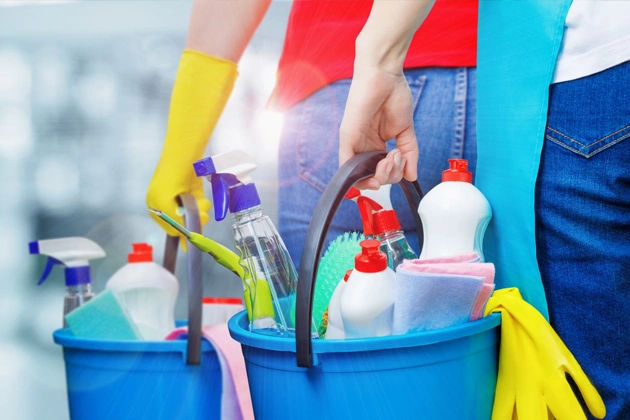Hiring a professional cleaning company is essential for maintaining a hygienic and productive workplace. However, contract signing without careful consideration can lead to costly mistakes, poor service quality, or legal complications. Businesses must thoroughly review agreements to align with their needs and expectations.
Below are the top ten office cleaning services contract mistakes to avoid.
1. Not Defining the Scope of Work Clearly
A vague contract can create confusion, leading to inconsistent cleaning standards. The agreement must detail specific areas to be cleaned, service frequency (daily, weekly), and exact tasks (dusting, mopping, trash removal). Ambiguities may cause the team to skip essential duties, resulting in an unclean environment. Clear expectations can help prevent disputes and ensure a consistently well-maintained workspace.
Therefore, if you want to avoid disputes regarding the scope of work, working with a reliable provider of office cleaning services in your area would be a great start.
2. Overlooking Insurance and Liability Clauses
A reputable cleaning company must have general liability insurance covering property damage or injuries and workers’ compensation protecting employees if they’re hurt on the job. Without proper coverage, a slip-and-fall accident or equipment damage could lead to costly lawsuits against the business hiring the cleaners.
As such, always request and verify proof of insurance before signing any contract to avoid unexpected legal and financial liabilities. This can safeguard both the company and its employees.
3. Ignoring Termination and Renewal Clauses
Many cleaning contracts contain auto-renewal clauses, silently extending agreements unless canceled within a strict notice period, sometimes 30–90 days before expiration. Others can enforce steep early termination fees, penalizing businesses that switch providers mid-contract.
Failing to review these terms can also trap companies in unsatisfactory arrangements or lead to surprise costs. Always scrutinize renewal and exit conditions before signing to maintain flexibility and avoid being locked into unfavorable long-term commitments.
4. Failing to Specify Cleaning Supplies and Equipment
A cleaning contract must explicitly state whether the provider supplies chemicals, tools, and equipment or if the client is responsible. Unclear terms can cause last-minute scrambles for supplies, inconsistent cleaning quality, or disputes over green product preferences. For example, service suffers if your business expects eco-friendly disinfectants but the crew arrives empty-handed. Detailing supply responsibilities in writing can help prevent operational hiccups and ensure alignment on sustainability standards from day one.
5. Not Including Performance Benchmarks
A well-defined Service Level Agreement (SLA) is critical for holding cleaning providers accountable. It should specify measurable benchmarks like spill response times, thoroughness checklists, and protocols for missed services. Without concrete performance metrics, such as inspection pass rates or complaint resolution timelines, your business has no leverage to address substandard work. Clear SLAs can empower clients to demand corrections, ensuring consistent cleanliness rather than vague promises of “quality service.” Always insist on quantifiable standards.
6. Skipping Background Checks on Cleaning Staff
Since cleaning staff frequently work unsupervised in secure areas, such as offices with confidential documents or IT server rooms, contracts must mandate thorough background checks for all personnel. This includes criminal history screenings and employment verification to mitigate theft or security risks.
A clause requiring bonded and vetted cleaners can protect sensitive company assets, ensure compliance with data protection laws, and provide peace of mind that only trustworthy individuals can access restricted spaces after hours. Never assume screenings are standard practice.
7. Agreeing to Unrealistic Pricing Structures
Opting for the cheapest office cleaning bid typically leads to inadequate staffing, diluted chemicals, or skipped tasks, costing more in long-term re-cleaning. Conversely, premium pricing without itemized services offers no real value. Demand transparent breakdowns of flat-rate inclusions versus hourly charges. Scrutinize whether pricing aligns with measurable outcomes like square footage covered or restroom sanitization frequency. Balanced costs reflect quality and never sacrifice standards for short-term savings.
8. Neglecting to Address Special Requests
Standard office cleaning contracts often exclude specialized services like high-level dusting, biohazard cleanup, or floor refinishing. If your workspace requires these, the contract must itemize them, including frequency and pricing, to prevent surprise fees. For example, “quarterly carpet steam cleaning” or “construction debris removal within 24 hours” ensures clarity. Verbal agreements won’t suffice as documented specifics can prevent disputes and guarantee critical tasks aren’t treated as billable extras after the fact. Always detail unique needs upfront.
9. Not Reviewing Subcontracting Policies
Many cleaning providers subcontract work to third-party crews, which can compromise quality control if unchecked. The contract must require subcontractors to adhere to identical service standards, insurance coverage, including general liability and workers’ comp, and employee screening processes as the primary company.
Without this clause, your business can risk inconsistent cleaning, security vulnerabilities, or liability gaps. Always verify subcontractor terms to ensure seamless, accountable service and never assume all workers operate under the same protocols as the main provider.
10. Failing to Get Everything in Writing
Relying on handshake deals with cleaning services invites costly misunderstandings. A legally binding contract must capture all agreed terms, including exact service hours, emergency spill response steps, key storage protocols, and even penalty clauses for missed cleanings.
Without written documentation, disputes over verbal promises like “We’ll clean the break room daily” become impossible to prove. Protect your business by insisting on comprehensive, signed contracts that leave no detail to memory or interpretation. Paper trails can prevent problems.
Final Thoughts
A well-structured office cleaning contract protects both the business and the service provider. By avoiding these common mistakes, your company can ensure a clean, safe, and professional work environment. Always consult legal or procurement experts before finalizing any agreement.











